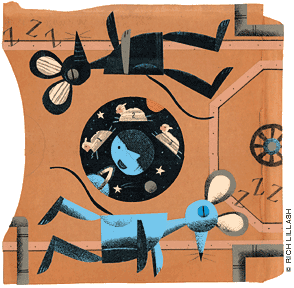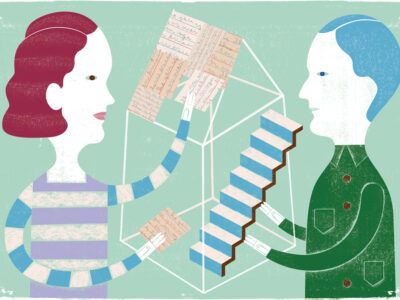
Heard on Campus | “Here on the ground, when you go to sleep, you’re used to kind of sinking into a nice firm mattress and settling into a soft pillow. There I was, strapped into the sleeping bag, and I was just floating. That’s a little disconcerting, the feeling of just floating above the floor of the sleep station. Plus if I let my arms free they would float in front of my face, which is not good, because if you wake up you think there’s some sort of hand coming at you. I had to get into the habit of making sure my hands were inside the sleeping bag and then I started putting things underneath the sleeping bag so I had the feeling something was under my back. Over time you do adapt to that and sleep reasonably well …
“Clearly, sleep is a very important issue in long-duration space flights. It’s important not just because we need sleep but because of the influence it has on our mood, on our performance, and how well we’re going to function with one another.
“Some have thought, ‘Why can’t we go on a long space voyage [such as to Mars] and be like bears? Why can’t we hibernate? Wouldn’t that be one way to address the problem?’ But we’re different from bears in several fundamental ways. What happens to your muscles if you go to bed for a long period is that they’ll start to shrink and waste away. And certainly if you’re immobile for a long time in bed, you have to worry about blood clots. People who are immobilized start to lose calcium in their bones. That’s a real challenge for the future, because right now our bodies aren’t really [equipped] to be immobile and at rest for that long a period of time.” —S.F.
—Dr. Jay Buckey, a biomedical researcher and astronaut, speaking September 14 at the Penn Humanities Forum, which in 2004-05 is focusing on “Sleep and Dreams.” In 1998 Buckey spent 16 days on the space shuttle Columbia, taking part in neuroscience experiments for NASA. Studies aboard the space shuttle found that the circadian rhythm of rats was disturbed even when their exposure to light and darkness was carefully regulated to simulate conditions on Earth. On the positive side, the problem of human snoring was almost eliminated in space—probably due to the lack of gravity compressing sleepers’ airways.




